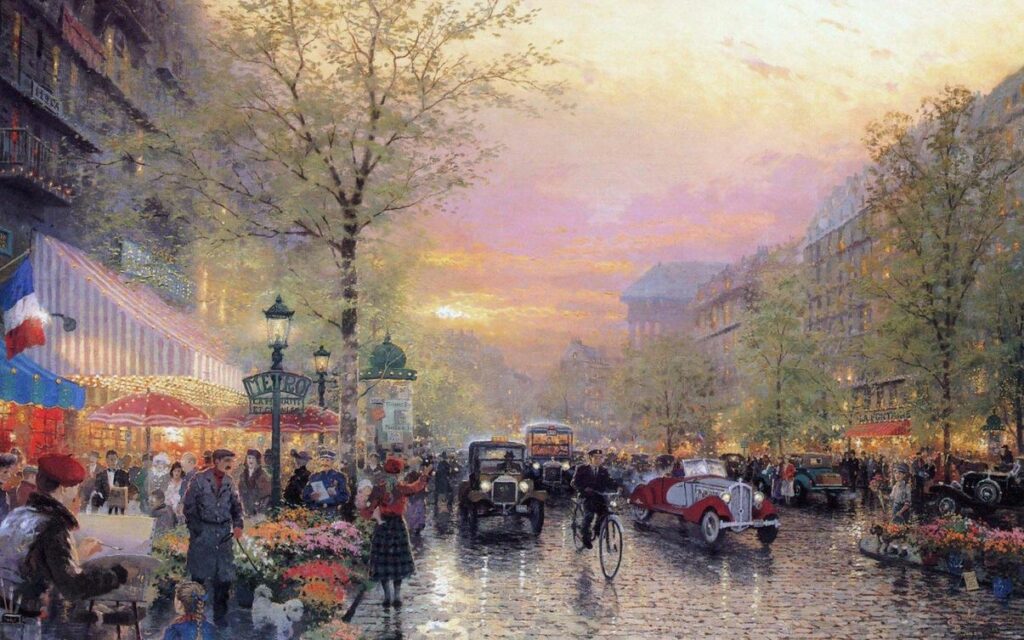…but unsurprisingly, the man who got there before me is Richard Hernandez.
No, I’m not going to excerpt any of it; you’ll have to read it for yourself, and if you read nothing else today, this should be it.

…but unsurprisingly, the man who got there before me is Richard Hernandez.
No, I’m not going to excerpt any of it; you’ll have to read it for yourself, and if you read nothing else today, this should be it.
…England, where, as the poet once wrote, autumn is the “season of mists and mellow fruitfulness” (as seen in the pic below, taken three days ago):

Oh okay: here’s the whole thing:
A parallel thought occurred to me as I was putting together the above post (Rank Stupidity): what about some decent books about WWII Britain?
Of course, there are thousands upon thousands of them, but what follows are two (unranked) lists of the ones I’ve read. I’ve mostly ignored the general history books (Churchill’s The Second World War, etc.) to concentrate on novels and biographies.
Let me start with the ones that spawned various of the WWII movies mentioned above. (F) denotes fiction, otherwise historical.
Then there are others that mostly haven’t been made into movies (yet):
That’s a partial list, of course. But it says something of all of them — some of which I haven’t read in over thirty years — that I remember them to this day.
I can’t remember whether I’ve ever told the story behind my first (published) novel, Vienna Days.
Here goes.
I’ve always been fascinated by how people’s lives are shaped and/or changed by massive societal change. Back in the early 1990s, this fascination was focused on the Secession Movement of the late 18th century in Vienna, and I wondered just how it would have felt to be someone who was a typical bourgeois, but over time got subverted by the changing times.
Of course, I’d done a lot of reading about 1880s Vienna (which is what sparked the whole thing) and the first thing that struck me was the fact that the suicide rate among young people in Vienna during this period was the highest ever recorded, and the highest in Europe as a whole. So naturally, that became the first sentence of the novel.
The second thing to strike me was that when Crown Prince Rudolph, heir to the throne of the Austro-Hungarian Empire had committed suicide, his funeral procession was attended by tens of thousands of people because, as the story goes, nobody likes a good funeral more than the Viennese. So of course that became the first scene of the novel.
A story idea then began to assert itself. Imagine that a bourgeois young man became seduced by the non-conformist Secession movement, and in secret began to do something that, if discovered, would spell ruin for his career — but he did it anyway, because the allure of this new movement was irresistible. But what could that be?
Luckily, I imagined that he would have considerable artistic talent, hitherto unrealized because of his studies, and that led him to secretly draw pornographic pictures. But pictures of whom?
I had already put this protagonist into a coffee bar where he became involved with a group of ne’er-do-well artists, and one of the people involved with the group was a mysterious and beautiful young woman named Astrid.
I was rather stuck at that point, so I stopped writing to read about pornography of that period, in Erotica (Charlotte Hill and William Wallace).
There I discovered the works of an anonymous Austrian artist, who had drawn his images in charcoal and cryptically signed his work “A1”. Wait… “A” for someone named “Astrid”? Why not? All I had to do was change the time period of the art, from the 1930s back to the 1880s — easy-peasy.
So I wrote the rest of the thing in about two months (I still had an actual job at the time, which took out my writing time, damn it).
And here’s a sample of the “A1” charcoals:
For some reason, I’ve recently been reading French History, because why not? I don’t know how it got started, but it did: and once started, I couldn’t stop. Here’s the bibliography, so far.
The Collapse of the Third Republic — William Shirer
The Franco-Prussian War — Michael Howard
Dawn of the Belle Epoque — Mary McAuliffe
The Vertigo Years: Europe, 1900-1914 — Philipp Blom (re-read, because it’s brilliant)
The Marne, 1914: The Opening of World War I and the Battle That Changed the World — Holger H. Herwig (told from the German side)
The French Army and the First World War — Elizabeth Greenhalgh
France and the Après Guerre, 1918–1924 — Benjamin F. Martin
La Belle France: A Short History — Alistair Horne (I’m still busy with this one; I’m only up to the succession of Henry II in 1547, so still a way to go.)
On deck: France On The Brink — Jonathan Fenby
Yeah, that’s what’s been keeping me busy over the past three weeks. All are well recommended except the last one (because I haven’t read it yet).
One last note: I cannot recommend The Vertigo Years highly enough. When people talk about the social- and psychological dislocation of the Information Age, you have to know that we’ve experienced it before: when the Age of Speed dawned, in around 1900. If you read no other book from the above list, this is the one.

Onetime political prisoner Nazanin Zaghari-Ratcliffe tells how one particular book kept her hopes up during her imprisonment in Teheran:
Nazanin Zaghari-Ratcliffe has revealed how a copy of the novel The Handmaid’s Tale among other books allowed her to feel liberated while she was locked up in Iran’s notorious Evin prison.
Well, okay. Considering how said dystopian novel is all about how a tyrannical government oppresses womyns, I guess that’s fair play (even though the actual Iranian Muslim government is far worse than Atwood’s).
But it does lead me to ask the question: if you were to be imprisoned for six years and could have only one smuggled book to keep you going, which one would you choose to have?
Right off the bat, I’m going to exclude religious works like the Bible, because that’s too obvious (and easy) a choice, especially for my religious Readers, bless ’em. But I will allow stuff like Thomas Aquinas’s Summa Theologica because they are essentially philosophical works.
My own choice is a simple one, as much for its volume as for its complexity and erudition:
From Dawn To Decadence (Jacques Barzun)
List your choice (and remember, you get one and only one) in Comments, with reasons if possible.